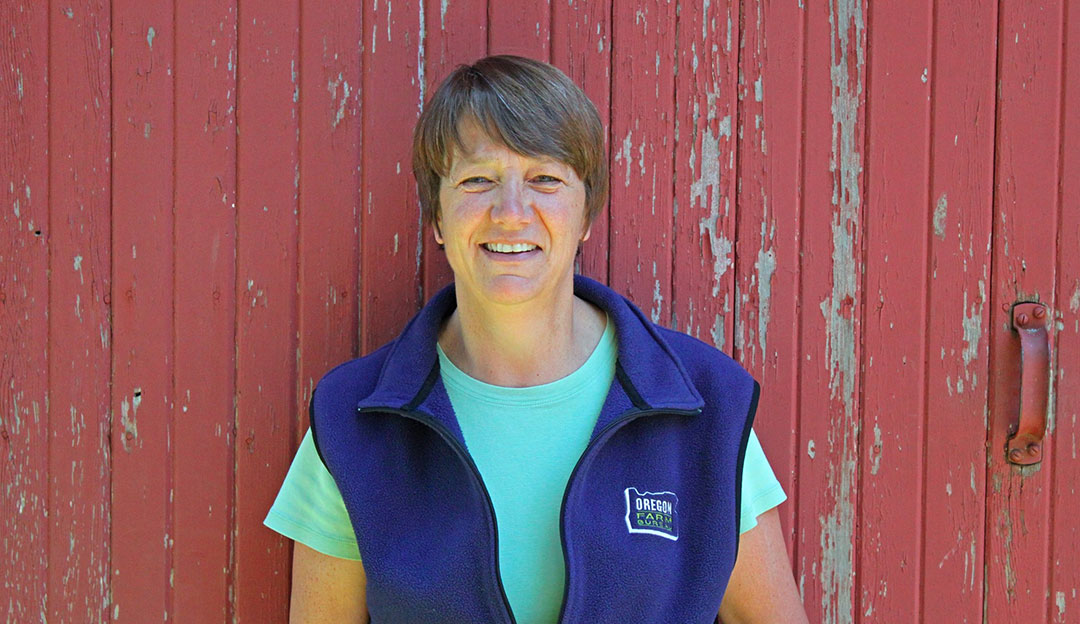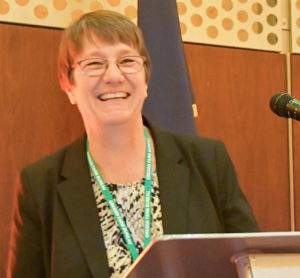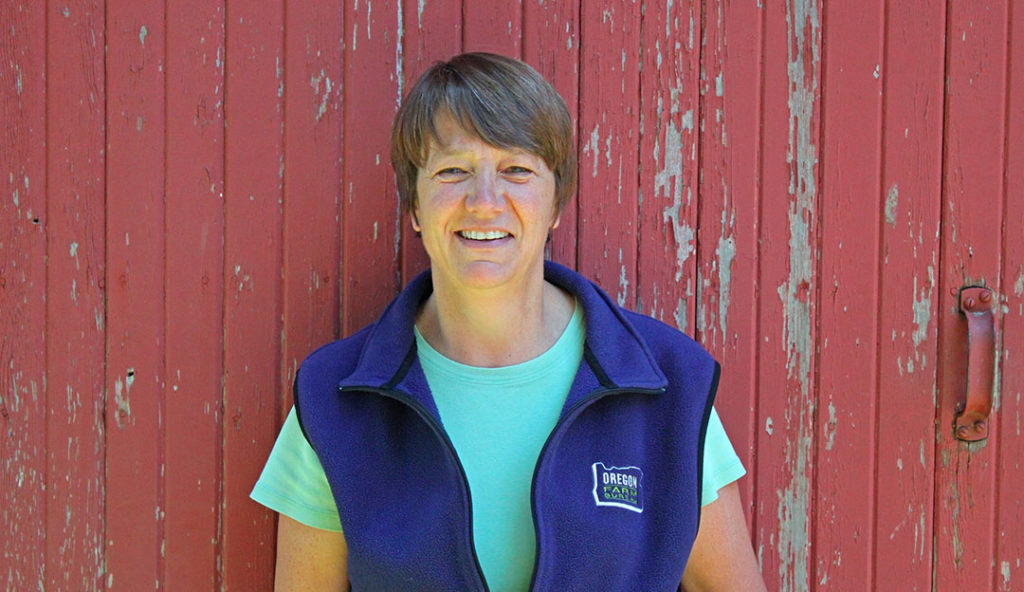Q&A with New Oregon Farm Bureau President Barb Iverson

Originally posted on the Oregon Farm Bureau website.
Jan. 6, 2020: At the 87th OFB Convention at Salishan last month, Farm Bureau members elected Barb Iverson of Clackamas County Farm Bureau to be OFB’s new president.

Oregon Farm Bureau President Barb Iverson
Over the years, Iverson has served as OFB 1st vice president, 2nd vice president, 3rd vice president, chair of the OFB Budget Committee, board member of the Oregon Ag Education Foundation, Clackamas County Farm Bureau president, on many OFB issue advisory committees, including labor and water, and on American Farm Bureau issue advisory committees for nursery and labor policy.
While at the American Farm Bureau headquarters in Washington, D.C. with presidents from other state Farm Bureaus, Iverson responded to the following Q&A so members could learn a bit about her and her goals.
Q: What’s your background?
BI: I grew up on our family farm near Woodburn. My earliest memory is of being in charge of picking the bottom half of a pole-bean row — which was the highest I could reach!
I attended Oregon State University and graduated with a degree in horticulture. I went to work for my uncle growing rhododendrons for Van Veen Nursery, a business my grandfather started.
After 12 years of an up-and-down market, I was fortunate to join Iverson Family Farms with my brothers. In 1983, I also helped start a small retail/mail-order business with my sister and sister-in-laws called Wooden Shoe Bulb Company. In 1985, we opened our tulip field to the public and today, the Wooden Shoe Tulip Festival attracts thousands to our farm every spring.
Besides tulips, the farm is growing a diversified combination of crops, including various grass seeds, vetch seed, filberts, table and wine grapes, and industrial hemp. We also extract CBD oil from our hemp grown on the farm.
Q: What inspired you to run for OFB president?
BI: The people in Farm Bureau are like family. We speak the same language and understand each other, which is rare outside of the farming and ranching community. I realized with my long and diverse farming career, as well as my 30 years of involvement in the organization, this was a challenge I wanted to take on.
Q: What are some of your goals as OFB president?
BI: The perception of what we do in agriculture isn’t matching up with reality. We need to tell our stories with lawmakers and the public more effectively. My ultimate goal is healthy rural communities. And to get there, we need healthy farms and ranches where the people who are immersed in the day-to-day care of their land can thrive.
Q: What do you see as some of Farm Bureau’s biggest strengths?
BI: We have a diverse membership that is extremely intelligent and passionate about what they do.
We also have some of the best lobbyists and staff in the state. Their presence in Salem is important for farmers and ranchers who can’t get away from their operations to express their concerns.
Q: Where would you like to see growth?
BI: Membership growth will be a big priority for 2020. Any farmer or rancher reading this who isn’t a member yet – or who used to be – is encouraged to join and help Farm Bureau keep Oregon agriculture vital, viable, and sustainable.
Those who aren’t farmers and ranchers, but who support Oregon agriculture, are also welcome to join as supporting members.
Join at OregonFB.org/join or call 503.399.1701.
Q: What are some state priorities heading into 2020?
BI: An OFB is leading an effort for farmers and ranchers to submit comments to the Oregon Dept. of Environmental Quality (DEQ) about its draft 2018-2020 Integrated Report.
In the draft report, DEQ proposes to list hundreds of miles of new waterways on agriculture and forestry lands as “water quality impaired” without any data showing that these waterbodies are impaired. DEQ should not be regulating the ag and forestry community without data.
In the upcoming 2020 state legislative session, bills around carbon/cap-and-trade have a lot of farmers nervous. I know this is a big hit for my farm with the natural gas we use for drying our industrial hemp.
The corporate activities tax is still an ongoing concern. There are still a lot of unanswered questions and registration has already begun. Besides that, many of our suppliers have already told us they will be passing on their increased costs to us. Think fertilizer and seed just to start. Farmers and ranchers are in a position of not being able to raise their price, so this will be a much harder hit for many than anticipated.
We are working with key legislators this session to try to exempt agricultural products from this tax.
Keeping up with the paperwork for farm employees is also a mounting concern for small farmers who can’t afford an HR department.
The ability to utilize land, water, and the tools farmers need to grow food and other ag products is always an issue for us at the capitol.
OFB will also continue to cooperate and collaborate with our partners working in the agriculture and natural resources sector to get things done.
Q: How about nationally?
BI: Labor! There is an H2A reform bill making its way through Congress. We are watching this closely as it could potentially have long-term ramifications for many family farms and ranches in our state.
The new hemp rules put out by the USDA could cause a number of headaches for growers, but there is still a comment period open. The lack of any input from the FDA is also creating a backlog in the hemp industry. Until the FDA makes a ruling, many larger manufacturers are sitting on the sidelines. Along with overproduction, this has created a huge drop in prices.
An issue at the federal level, although really working its way through the Army Corp of Engineers, is the Willamette Basin water reallocation. This has the potential of impacting many farms and ranches in the Willamette Valley who’ve had irrigation rights in that system for generations.
Trade is very important to Oregon agriculture and we hope to see more international markets open up for farmers and ranchers.
Q: Why do you believe so strongly in Farm Bureau?
BI: I trust in those who live and work on the land of this great state: our farmers and ranchers. Their vision of sustainability is in generations, both previous and future.
How could Farm Bureau not advocate for that?

Oregon Farm Bureau President Barb Iverson